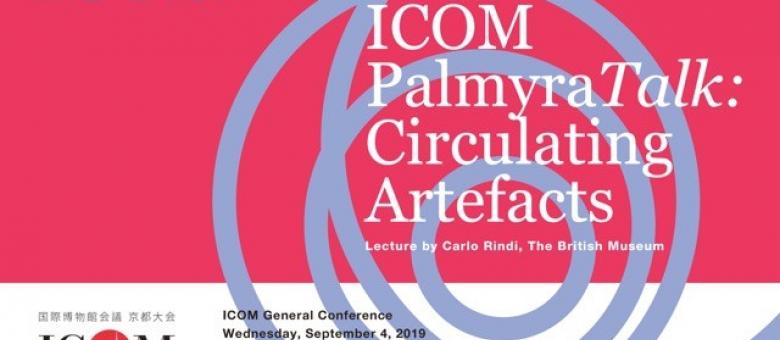
Kalender

ICOM Palmyra-Talk at the ICOM GC in Kyoto
Circulating Artefacts: An online platform against the looting and sale of illicit antiquities
Lecture by
Dr. Carlo Rindi, The British Museum
ICOM General Conference
Wednesday, September 4, 2019
13:30 – 14:30, ICC - Kyoto International Conference Center, Room „Sakura”
The ICOM Palmyra Talks are a series of events organized by ICOM Austria to raise public awareness on the importance of protecting archaeological sites, fighting against illicit trafficking and trading of cultural objects to save our common heritage. The special ICOM Palmyra Talk on the occasion of the ICOM General Conference in Kyoto presents a groundbreaking new online-platform initiated by the British Museum to detect and recover looted artefacts.
Dr. Carlo Rindi (The British Museum), Dr. Danielle Spera (Präsidentin ICOM Österreich), Dr. Peter Keller (ICOM Director General)
Mag. Elke Kellner (ICOM Österreich), Dr. Danielle Spera (Präsidentin ICOM Österreich), DDr.in Barbara Glück (Direktorin KZ-Gedenkstätte Mauthausen)
PROGRAM
Welcome
Dr. Danielle Spera, President, ICOM Austria
Dr. Peter Keller, Director General, ICOM
Lecture:
“Circulating Artefacts: An online platform against the looting and sale of illicit antiquities”
Dr. Carlo Rindi, Lead Curator: Circulating Artefacts, Dept. Egypt and Sudan, The British Museum
The “Circulating Artefacts Project”
The “Circulating Artefacts Project” is a key initiative of the British Museum against the looting and trafficking of illicit antiquities. Heritage professionals, collectors, art dealers, law enforcement agencies and anyone else can have antiquities appraised for possible signs of illicit provenance, enabling the detection and recovery of countless looted artefacts that would otherwise go unnoticed. Within a year of the project’s inception, over 600 illicit antiquities have been identified.
The British Museum, supported by the British Council’s Cultural Protection Fund, has launched a key initiative against the looting and trafficking of illicit antiquities. A dedicated team of experts runs an online platform where heritage professionals, public and private collectors, art dealers, law enforcement agencies and anyone else can have antiquities appraised for possible signs of illicit provenance. This service, offered free of charge, is enabling the detection and recovery of countless looted artefacts that would otherwise go unnoticed. The platform rests on a restricted, ever-growing database of objects that are, or have been, in circulation. All reported and spotted artefacts are vetted on information provided and on evidence contained in the objects themselves. The current focus is on cultural property from Egypt and Sudan, but the system is ready for extension to other regions.
The project avails of widespread engagement from police and legal experts, fellow academics, heritage professionals and a growing number of actors in the antiquities trade itself. We support and train heritage staff in the countries of origin, helping them better research the art market and thereby better protect affected archaeological sites. Within a year of the project’s inception, we identified over 600 illicit antiquities. Many have been repatriated, and the more serious cases have prompted police investigations. We anticipate that colleagues, collectors, the trade, police and members of the general public will increasingly make use of our vetting service, thus contributing to a cleaner and more accountable art market. Everyone can help by supplying images and information on artefacts.
Enquiries about the project, or any offers of support, are welcomed at: CirculatingArtefacts@britishmuseum.org
Dr. Carlo Rindi
Dr. Carlo Rindi is Lead Curator in the British Museum’s Circulating Artefacts project, Dept. Egypt and Sudan, The British Museum. He specialises in the material culture of Graeco-Roman Egypt, with a particular interest in investigating regional productions and craftsmanship. He has conducted extensive research on burial customs, as well as on aspects of cultural heritage protection and preservation. Since 2014, he has been involved with the Dakhleh Oasis Project in Egypt’s Western Desert, and he has completed his doctoral research at Monash University (Melbourne).
ICOM General Conference in Kyoto





